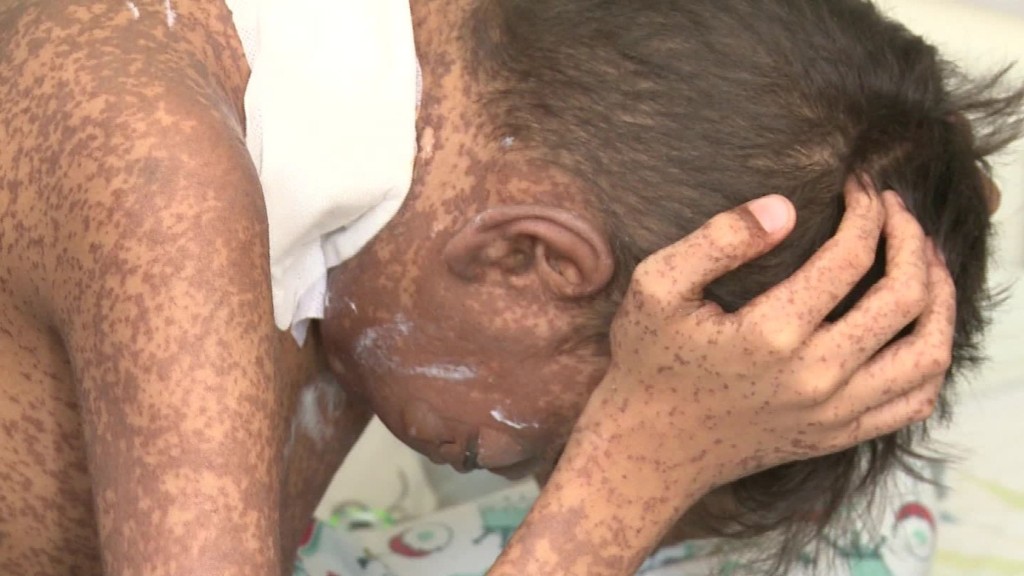
As it sinks deeper into chaos, Venezuela has huge bills coming up, and it still hasn't paid debts that were due weeks ago.
The country's state-run oil company, PDVSA, on Friday paid roughly $900 million to bondholders, but it still owes $350 million more that was due earlier this month.
Many experts who follow Venezuela's economy see a government default as inevitable. The consequences of that would be severe for a nation of 30 million people that's already running out of food and medicine.
Related: Venezuela's children are dying
Making matters worse: More bills come due next week. On November 2, Venezuela owes $1.1 billion. It will have only a three-day grace period before a default occurs. Venezuela's bonds are owned by an array of investors, from Wall Street strategists to ordinary Americans with 401(k)s.
The government has slowly drained its savings to pay down debt. In 2011, its central bank had $30 billion. In 2015, $20 billion. This year: $10 billion. By comparison, Venezuela's neighbor Colombia has four times as much in reserves: $46 billion.
Leaders from across the Western Hemisphere met in Toronto on Thursday to condemn Venezuela's authoritarian regime, which has allowed the country's vast resources -- it has more crude oil than any other nation -- to go to waste.
"The government of Venezuela is choosing the path of dictatorship," Canada's Foreign Minister Chrystia Freeland told her counterparts in Toronto. Its regime "must face consequences that go beyond harsh words and condemnations."
Related: Venezuela is blaming Trump for missed debt payments
Freeland didn't specify what consequences President Nicolas Maduro and his administration could face. She said she hopes Cuba, an ally of Venezuela's, will join the international condemnation of Maduro's power grab.
The Western leaders haven't collectively slapped sanctions on Venezuela, but its leaders say that option is on the table.
One of Maduro's biggest critics was also in Toronto: Former Attorney General Luisa Ortega, who fled the country after Maduro's newly installed legislature banished her from her post.
"In Venezuela it is impossible to raise our voices because people are persecuted and imprisoned," Ortega said Thursday at a separate event at the University of Toronto.
The so-called Lima Group -- named after its first meeting in Lima, Peru, in August -- consists of foreign ministers from Canada and several Latin American nations, including Brazil, Mexico, Colombia and Argentina.
That type of unity is rare in Latin America, a region averse to nations' meddling in each others' affairs after a string of coups and dictatorships in the 20th century, some backed by the CIA.
The United States, which didn't send a representative to Thursday's meeting, has slapped several rounds of sanctions on Maduro's government and its leaders.
Maduro's surrogates have blamed those sanctions for the country's widespread problems and its prolonged delays on debt payments.
Related: Venezuela President tells people to eat rabbits amid food shortages
Excuses aside, experts say Venezuela is likely to default on its debt. It's just anyone's guess when that exactly will happen. The government has come close to defaulting before, only to find cash at the last moment. What's different now is that its cash pile has dwindled significantly.
The consequences of a default would be dire, though the full domino effect may not take place immediately.
Foreign investors would have the right to seize Venezuela's only valuable asset -- oil -- outside the country. That would strangle the government's cash flow, severely restricting its ability to import food and other essentials. Maduro's grip on power would be loosened, experts say.
"A default -- that would trigger the fall of the government," says Edward Glossop, an economist who covers Latin America for Capital Economics, a research firm. "If they were to default ... we're going to get a very painful political transition."


